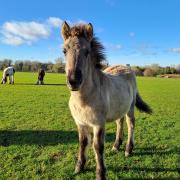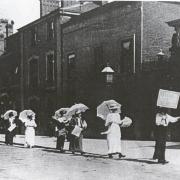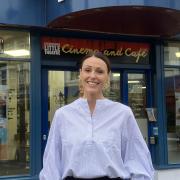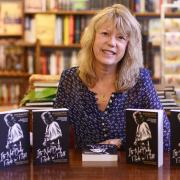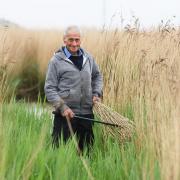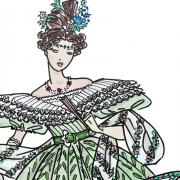Farrier Sarah Pinkney explains to Serena Shores why she would like to see more women working in her trade
Farrier Sarah Pinkney’s love of horses began when she learned to ride in Germany while her father was stationed there. At university, she combined this interest with a passion for biology and earned a degree in equine science at Hartpury College. However, despite this, she couldn’t settle on a job.
“I struggled to find a career I enjoyed, trying microbiology and working as a graduate trainee accountant, until my best friend from university suggested I try farriery,” says Sarah, 33, from Norwich. “Her farrier, whom I’m good friends with now, gave me a swift introduction to forging skills out of the back of his van. It was all the encouragement I needed.”
Despite the large number of women and girls who not only ride, but also work in the daily care of horses, feeding and mucking them out at yards and equestrian centres, it isn’t typical to come across a female farrier. “We are still currently the minority in the profession, but women are certainly on the rise,” Sarah explains.

“There are women who hold the highest qualifications, those that have apprentices, are examiners and those who compete for their country in the internationals. In Norfolk, there are several both qualified and apprentices and also nationally, those that are at the top, who certainly hold the respect and admiration of their male counterparts.”
Sarah, who works with Stephen Britten, feels that farriery is one trade that simply isn’t presented to girls as an option at school, unlike veterinary science, for instance. “Veterinary science has become popular with women and vets and associated fields appear to have fairly even numbers of men and women.

“When school children visit Weston,” she explains, “they are busily on and off horses having lessons and not there to learn about my job in a busy yard environment.”
The physical demands of the job are something that Sarah immediately encountered with her friend’s farrier – the weight of the hammer being unfamiliar and making her feel that “her arm might fall off.” When completing a three-month forging course in Scotland to complete all the pre-requisites for applying for an apprenticeship, Sarah recalls soaking her hands in surgical spirit to harden them.

“I think the heavy work argument may be little flimsy,” says her boss, Stephen. “When I was 16, I wanted to go straight into farriery, but I simply wasn’t physically or mentally mature enough. There may be a bias held by some training farriers and a perception that metalwork belongs to men, but the truth is it’s about technique rather than strength. When I first started working with a hammer, my hands were covered in blisters!”
Sarah was the only woman in her intake of around 25 apprentices at college, but five years ago, she qualified with a distinction and the award for best portfolio and best exam paper across the three colleges and is now the third woman to become an associate of the Worshipful Company of Farriers. As horses can be used to being dealt with by women – whether owners, grooms or instructors, it can be advantageous to be female.

“I often find horses react better to Sarah than to me,” says Stephen. “They are extremely sensitive to emotional responses and older horses can be a little jumpy. I have had calls requesting a female farrier as the horses seem to gain confidence around them.”
There have been several technical innovations, such as ready-made shoes, plastic, stick-on shoes and of course the electric grinders and gas-powered portable forges that both Sarah and Stephen use. But Sarah is keen to point out that in order to qualify, the skill set is the same as centuries ago.

“You have to be able to make and fit shoes from scratch,” she says. “It is certainly hard work and you have to want to do it, but I was so fortunate that out of the 20 letters I wrote to potential training farriers, my one offer was from John Blake in Attleborough. He was a fantastic boss who never gave me any doubts I could succeed in the profession.”
Stephen was also trained by John Blake and knows him to be one farrier who breaks the mould. “John currently has a female apprentice. He’s very proactive and will choose the best candidate. I have never had any negative feedback about Sarah. She is also better at dealing with clients than me; if I had another apprentice, I would choose a woman.”
In terms of encounters with the uninitiated, Sarah remembers a couple: “When I turn up at someone’s house, I’ve had ladies get rather ecstatic about the fact I’m a woman which they weren’t expecting, even though at grass roots level, 90% of our clients are female!

“Then there was one ‘good old boy’ who brought in his heavy horses to be shoed. He leaned in to my former boss, John Blake, with a concerned look in his eye. ‘Can she, like, do that?’ The answer is ‘yes’. But you have to just give it a go!
“Yes, the wind is bitter in winter when it howls around your forge and your arms will ache,” Sarah smiles. “But my experience of this trade has been of a huge amount of support from my male teachers, bosses and peers,” she concludes. “Many go out of their way to help you progress and further your skills, female or not. This kind of support is paramount to ensuring a high level of workmanship is maintained and to keep farriery in good stead.”





